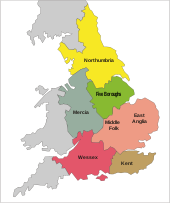North Sea Empire
However, the invasion fell apart: the men of the Kingdom of Lindsey, who had promised to supply horses for a tactical raid, were not ready before the English nobles had reinstalled King Æthelred (whom they had previously sent into exile), after forcing him to agree to govern less harshly.
He secured relaxation of tolls levied on pilgrims journeying to Rome from Northern Europe, and on Papal fees for English archbishops receiving their pallium; he also began a relationship with Conrad that led to the Emperor's son Henry marrying Cnut's daughter Gunnhild and before that to the Emperor ceding to Denmark Schleswig and a strip of ancient Danish territory between Hedeby and the Eider that the Germans had occupied as a buffer zone against the Danes.
A large contingent of Danish ships joined him, and Olaf withdrew into the Oslo Fjord while Cnut sailed along the coast, landing at various points and receiving oaths of allegiance from the local chieftains.
[7] He may have had coins minted either in the capital, Sigtuna, or in Lund, then part of Denmark, with the inscription CNVT REX SW ("Cnut King of the Swedes").
[27][28] In addition to part of Sweden, of which he or the person who wrote the heading to his letter claimed he was king part of, Cnut received tribute from the Wends and was allied with the Poles; in 1022, together with Godwin and Ulf Jarl, he took a fleet east into the Baltic to confirm his overlordship of the coastal areas that the Danish kings dominated from Jomsborg.
All these and likely also the Welsh[31] paid tribute, on the model of the Danegeld that Æthelred had instituted to pay off the Danes; and Cnut was thus reasserting the dominion over the Celtic kingdoms that recent English kings had had to let lapse, as well as punishing those who had supported Olaf against him.
[35] In England, Cnut assiduously promoted the interests of the Church, and this brought him acceptance from the Christian rulers of Europe that no other Scandinavian king had previously been accorded.
In 1018, Cnut revived at least two earldoms in Wessex and at a meeting at Oxford, his followers and representatives of the English agreed that he would govern under the laws of King Edgar.
[39] However, it was left to another of Cnut's earls, Siward, to protect his earldom of Northumbria by consolidating English power in Scotland; at his death in 1055 he, not the king, was overlord of all the territory that the Kingdom of Strathclyde had annexed early the previous century.
[30] The Danes had more reason to grumble about Cnut's absences than the English; he reigned primarily from England, leaving regents in charge in Denmark.
[43] In Norway, Cnut stayed into the new year and then left Jarl Erik's son Hakon in charge as his regent (he had served Sweyn Forkbeard in the same capacity), but he drowned the following winter.
[46] As Stenton points out, by appointing different sons his heirs in different countries, he demonstrated that he did not have "the deliberate intention of founding a northern empire ... [which] would remain united after his death.
[48] In any event, it was clear throughout Cnut's reign that the weakness of his empire lay in the impossibility of finding loyal and competent regents to govern when he could not be present.
In Denmark, Harthacnut was already ruling as king, but he was unable to leave for three years because of the threat that Magnus of Norway would invade to exact revenge.
[52] He died suddenly in June 1042 "as he stood at his drink" at the wedding feast of Tovi the Proud, one of the Danish thegns of his father's court.
[53] However, Magnus of Norway, utilising the agreement he had made with Harthacnut in 1040, took control of Denmark and had plans to invade England and reunite the kingdoms and Empire.
In consolidating his power in Denmark he crushed a Wendish invasion at the battle of Lyrskov Hede initiated shortly after he had destroyed the Jomsviking heartlands.
This may have been an effective own goal, as it destroyed one of the key political and military components of Sveyn Forkbeard and Cnut the Great's rise to dominence.
"And then Sveyn expelled Magnus from Denmark and entered the country by a huge carnage, and the Danes paid him a large sum of money and recognized him as king.


